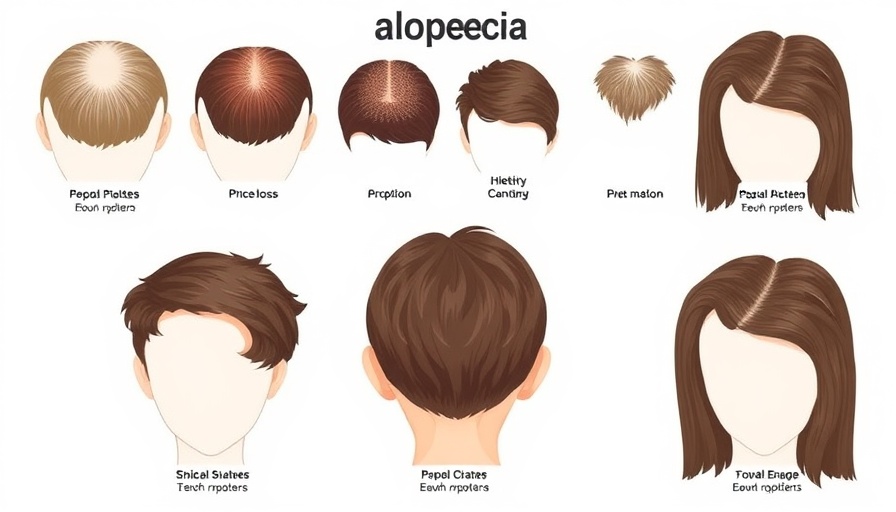
Recognizing the Early Warnings of Alzheimer’s
As we traverse through life, forgetfulness can seem like a familiar companion—misplacing keys or struggling to remember an acquaintance's name. However, when these lapses occur more frequently, especially in older adults, it may not just be a benign consequence of aging. In fact, these memory failures could signal more severe conditions, such as dementia or Alzheimer’s disease. Knowing the difference might just help in seeking timely support.
Understanding Changes in Mood and Personality
One crucial sign of Alzheimer's can manifest as changes in mood and personality. Is there someone in your life who has withdrawn from social activities or lost interest in hobbies they once cherished? These seemingly minor shifts may indicate that the individual is struggling with more profound issues. Many people experiencing dementia find it hard to engage in social interactions; they may feel overwhelmed by conversations or feel a sense of anxiety creeping in during gatherings. Such changes can profoundly affect their mental health, leading to feelings of fear or depression, making it essential to involve a primary care provider for evaluation.
Everyday Memory Lapses: When to be Concerned
Every person misplaces an item now and then, but when these instances of forgetfulness begin to interfere with daily tasks, it’s a cause for concern. Individuals with Alzheimer's might face challenges in performing routine tasks, be it preparing dinner or managing household finances. They may also confuse current dates, seasons, or simple facts. Another alarming sign can be the emergence of risky decision-making that diverges from their usual judgment. Recognizing these nuances can be key in identifying a potential cognitive decline early on.
Communication Struggles
Losing the ability to communicate effectively can also point to cognitive deterioration. If an individual suddenly refers to a clock as a “round thing” or frequently misnames common objects, these could be troubling signs. Moreover, getting stuck mid-sentence or repeating phrases indicates difficulties with memory retention and processing. As difficult as it may be to face, if someone in your life exhibits such behaviors, it's prudent to consult with a physician.
Important Steps to Manage Alzheimer’s Risk
Recognizing these signs is only the first step. Once these behaviors are identified, proactive measures can be taken to manage and treat the condition. Here's how:
Fueling Brain Health Through Nutrition
Maintaining a healthy diet is integral to preserving not just physical health but cognitive wellness. Foods rich in Omega-3 fatty acids, vitamins, and antioxidants are pivotal for brain function. As Alzheimer’s progresses, eating habits may change. Thus, focusing on nutritious, easily swallowable foods can alleviate these challenges and ensure essential nutrient intake.
The Power of Physical Activity
Exercise plays a vital role in maintaining mental acuity and overall well-being. Engaging in regular exercise can help improve cognitive functions, manage mood, and lower the risk of physical injuries. Activities such as walking, swimming, or even gardening can foster not just physical health but also mental clarity, contributing to a lower risk of dementia.
Prioritizing Quality Sleep
Sleep is more critical than many realize. Quality rest aids in memory consolidation and overall brain health. Unfortunately, sleep disturbances can become more prevalent for those experiencing Alzheimer’s. Creating a calming nighttime routine and adhering to a consistent sleep schedule can go a long way in promoting better sleep patterns.
Connecting with the Community
Living with someone faced with Alzheimer’s can be a daunting journey, and having a solid support network is invaluable. Local healthcare facilities often host support groups and provide resources for families dealing with cognitive decline. Making connections within the community can not only help manage one's mental health but also bring comfort to those affected.
Embracing the Journey
Understanding the nuances between ordinary forgetfulness and the early signs of Alzheimer’s is a powerful tool for individuals and caregivers alike. As we move forward in life, fostering awareness can lead to timely interventions; hence, it is vital to consult health care providers whenever there is concern. Remember, paving the way for cognitive wellness is a journey worth embarking on—to preserve not only memory but the essence of everyday life.
In conclusion, if you notice concerning changes in yourself or a loved one's memory or behavior, don't hesitate to reach out to a healthcare professional. Timely evaluation can lead to better management and improved quality of life.
 Add Row
Add Row  Add
Add 





Write A Comment